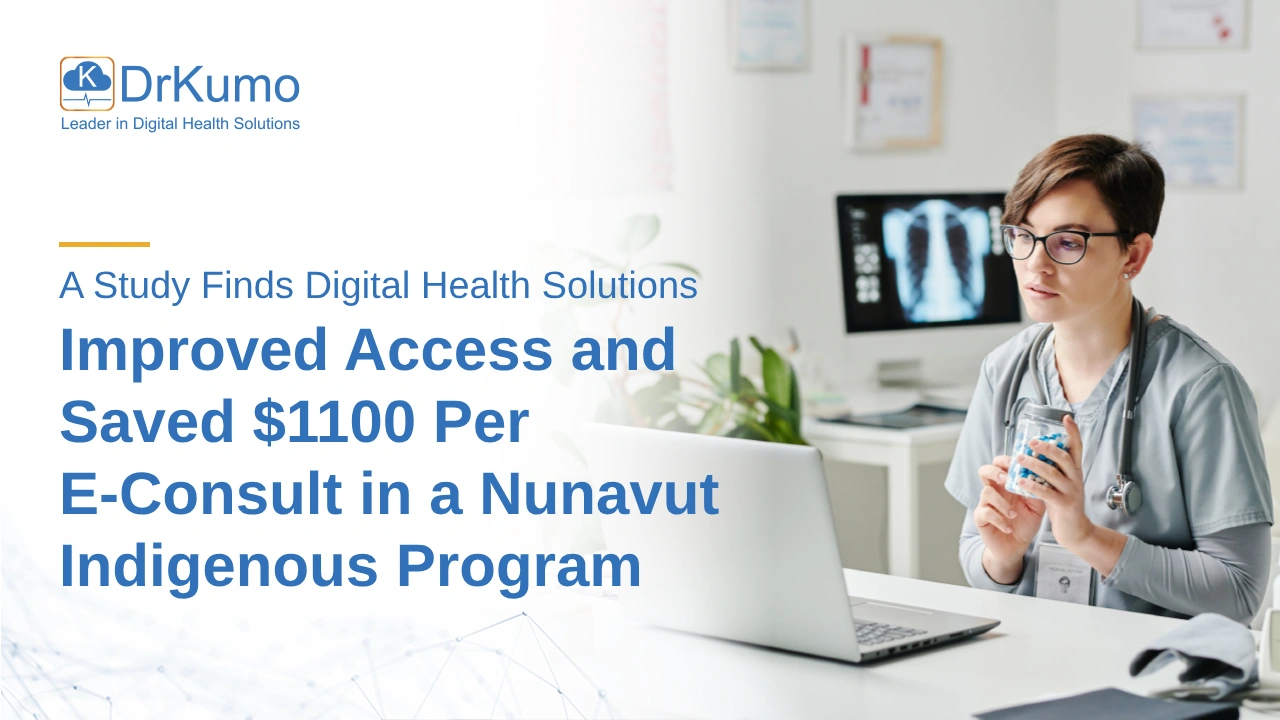The integration of digital health solutions in remote and underserved communities, particularly in Indigenous regions in the United States, has shown potential in improving access to healthcare services while reducing costs. One area where these solutions have demonstrated positive outcomes is in the provision of telemedicine and e-consults, particularly in remote Indigenous communities like those in Nunavut.
A study conducted in Nunavut, Canada, has demonstrated that using e-consults for specialist advice can save approximately $1100 per e-consult, primarily due to reduced travel expenses and lost wages for both patients and healthcare providers.
This blog explores the role of digital health solutions in enhancing healthcare access and reducing costs, particularly for Indigenous populations. We’ll delve into how telemedicine and remote monitoring services, such as e-consults, are transforming care delivery in these communities and helping to bridge healthcare disparities.
The Impact of Digital Health Solutions in Indigenous Communities
Indigenous populations, particularly those in remote areas, often face significant barriers to accessing healthcare, including long travel distances, limited healthcare infrastructure, and a lack of local specialists. Digital health solutions like telemental health and electronic consults (e-consults) have emerged as practical tools to help address this gap. These solutions provide patients with the ability to receive timely consultations with specialists without the need to travel long distances, potentially saving time and reducing the financial burden of travel expenses and missed work.
The pilot e-consult program in Nunavut, serving Inuit and other Indigenous populations, reported measurable benefits, including a cost savings of approximately $1100 per e-consult. This cost-saving was achieved by reducing the need for patient referrals, long-distance travel, and the associated lost wages, which are often prohibitive for many in these communities. Moreover, this approach can support continuity of care by enabling healthcare providers to communicate more efficiently and share essential patient information without requiring formal in-person consultations.
Advantages of Telemedicine for Mental Health Services
In addition to the success of e-consults in improving access to specialist care, telemental health services have shown promise in addressing mental health needs among some Indigenous communities. Mental health services are a critical area where digital health solutions can make a significant difference, especially given the high levels of intergenerational trauma and mental health challenges within these communities.
Telemental health services can provide psychiatric evaluations, therapy, and psychoeducation via videoconferencing, offering patients a more accessible means of care. While remote mental health care can help reduce some of the stigma often associated with seeking treatment, its effectiveness can depend on individual preferences and community contexts.
These services also provide a sense of connection and emotional well-being, as patients can remain within their communities and engage with family members during consultations, which is particularly important in Indigenous cultures. By embracing remote access to specialists, digital health solutions have the potential to contribute to a more equitable and accessible healthcare system for Indigenous populations.
How DrKumo’s Solutions Align with Digital Health for Indigenous Populations
DrKumo is a leader in secure, intelligent, and proven digital health solutions, specifically designed for chronic care management. Through Remote Patient Monitoring (RPM), DrKumo offers real-time health monitoring with advanced medical devices such as blood pressure monitors, glucometers, and pulse oximeters. These devices collect critical health data and securely transmit it to healthcare providers, enabling them to monitor patient conditions continuously without frequent in-person visits. This can be especially beneficial for patients in rural or underserved areas, where access to healthcare professionals may be limited.
DrKumo’s telehealth solutions are URAC-certified and comply with HIPAA regulations, ensuring that patient data is secure and confidential. DrKumo’s platform also adheres to Federal Healthcare Enterprise Cybersecurity standards and integrates Artificial Intelligence (AI) and Machine Learning (ML) to enhance the monitoring process. This integration enables healthcare providers to proactively manage patient care, optimize health outcomes, and reduce healthcare costs. By focusing on patient-centered care, DrKumo’s RPM platform empowers patients to take an active role in their health while supporting timely and effective interventions from their care teams.
Takeaways
Digital health solutions, such as e-consults and telemedicine, have demonstrated positive results in improving healthcare access for some Indigenous communities. The success of these programs in providing cost savings, improving mental health access, and addressing health inequities underscores their value.
Digital health solutions, such as e-consults and telemedicine, have demonstrated positive results in improving healthcare access for some Indigenous communities.
If you’re ready to explore DrKumo’s advanced digital health solutions, contact us today to learn how our Remote Patient Monitoring platform can enhance chronic care management.
Disclaimer: DrKumo’s services are designed to assist with remote patient monitoring and chronic care management. The effectiveness of these services may vary depending on individual patient needs and should be used in conjunction with traditional healthcare practices.








